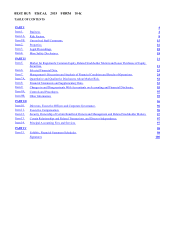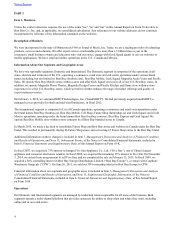Best Buy 2015 Annual Report Download - page 20
Download and view the complete annual report
Please find page 20 of the 2015 Best Buy annual report below. You can navigate through the pages in the report by either clicking on the pages listed below, or by using the keyword search tool below to find specific information within the annual report.
Table of Contents
13
• The impact of changes in tax laws (or interpretations thereof by courts and taxing authorities) and accounting
standards; and
• The impact of litigation trends, including class action lawsuits involving consumers and shareholders, and labor and
employment matters.
Regulatory activity focused on the retail industry has grown in recent years, increasing the risk of fines and additional operating
costs associated with compliance. Additionally, defending against lawsuits and other proceedings may involve significant
expense and divert management's attention and resources from other matters.
Changes to the National Labor Relations Act or other labor-related statutes or regulations could have an adverse impact
on our costs and impair the viability of our operating model.
The National Labor Relations Board continually considers changes to labor regulations, many of which could significantly
impact the nature of labor relations in the U.S. and how union organizing and union elections are conducted. The U.S.
Department of Labor is considering new regulations requiring companies to publicly report the use and associated expense of
external resources providing labor relations guidance and advice. As of January 31, 2015, none of our U.S. operations had
employees represented by labor unions or working under collective bargaining agreements. Changes in labor-related statutes or
regulations could increase the percentage of elections won by unions. If any segment of Best Buy’s operations became
unionized, it could increase our costs of doing business and adversely affect our operations.
Economic, regulatory and other developments could adversely affect the profitability of our promotional financing and
credit card arrangements and our promotional financing offerings and therefore our operating results.
We offer promotional financing and credit cards issued by a third-party bank that manages and directly extends credit to our
customers. The cardholders can receive low- or no-interest promotional financing on qualifying purchases. Total revenues from
these programs accounted for approximately 20% of our revenue in fiscal 2015. We view these arrangements as a way to
generate incremental sales of products and services from customers who prefer the financing terms to other available forms of
payment. In addition, we earn profit-share income from our banking partners based on the performance of the credit card
portfolio, and the amount of income we earn in this regard is subject to numerous factors such as the volume of credit card or
financing transactions, bad debt rates, interest rates, the regulatory environment and expenses of operating the program.
Adverse changes to any of these factors could impair our ability to offer these programs to customers and reduce our ability to
earn income from sharing in the profits of the program.
We rely heavily on our information technology systems for our key business processes. Any failure or interruption in
these systems could have a material adverse impact on our business.
The effective and efficient operation of our business is dependent on our management information systems. We rely heavily on
our management information systems to manage all key aspects of our business, including demand forecasting, purchasing,
supply chain management, point-of-sale processing, staff planning and deployment, website offerings, financial management
and forecasting and safeguarding critical and sensitive information. The failure of our management information systems to
perform as we anticipate, or to meet the continuously evolving needs of our business, could significantly disrupt our business
and cause, for example, higher costs and lost revenues and could threaten our ability to remain in operation.
In addition, we utilize complex information technology platforms to operate our websites and mobile applications. Disruptions
to these services, such as those caused by unforeseen traffic levels or other technical difficulties, could cause us to forego
material revenues and adversely affect our reputation with consumers.
We utilize third-party vendors for certain aspects of our business operations.
We engage key third-party business partners to support various functions of our business, including but not limited to,
information technology, human resource operations, customer loyalty programs, promotional financing and customer loyalty
credit cards, customer warranty and insurance programs. Any material disruption in our relationship with key third-party
business partners or any disruption in the services or systems provided or managed by third parties could impact our revenues
and cost structure and hinder our ability to continue operations, particularly if a disruption occurs during peak revenue periods.
























